RESEARCH
Improving Equity through High-Dosage Tutoring (HDT)
A 2022 research study has shown that high-dosage tutoring (HDT) outperformed on-demand tutoring in terms of academic outcomes since more students access tutoring when it occurs during the school day on an ongoing basis. Researchers from Brown University ran a randomized controlled trial at Aspire Public Schools, a charter district in California, with about 7,000 students, 75% of whom qualify for free/reduced lunch. Nearly all were eligible for free virtual tutoring with an online whiteboard and text chat feature.
"If the goal is to mitigate learning gaps for students who struggled the most, providing opt-in access to personalized tutoring and other educational resources is unlikely to help."
 (Robinson, Bisht, & Loeb, 2022)
(Robinson, Bisht, & Loeb, 2022)Key Takeaways from the Research
"Providing tutoring during the school day and integrating tutoring with the schools instructional program so that the school determines which students participate in this high-return educational opportunity is far more likely to reach and benefit struggling students."
 (Robinson, Bisht, & Loeb, 2022)
(Robinson, Bisht, & Loeb, 2022)- The value of tutoring is well established as a learning gap intervention–over 100 randomized, controlled trials have demonstrated this.
- On-demand tutoring is proven to increase academic outcomes, showing with a causal impact they will pass all their courses and generate an increase in GPA (1.3% in math), but not without some criticism:
- On-demand tutoring adoption is often lower than desired or planned.
- High-achieving students will opt-in to tutoring much more often than struggling students.
- The “opt-in approach” to tutoring exacerbates inequality.
- Targeted investments are required, “particularly consider scheduling personalized, high-impact tutoring during the school day for students who need it most,” also referred to as high-dosage tutoring (HDT).
According to the report, on-demand tutoring perpetuates inequality. The researchers share, “We found that the vast majority of students do not take-up an opt-in educational resource, even when it can promote learning, and that struggling students are the least motivated to proactively access and benefit from the additional support.” Without targeted interventions, struggling students are unlikely to opt-in to the supports and will continue to fall behind as high-achieving students benefit from the resource.

Source: Robinson, Carly D., Biraj Bisht, and Susanna Loeb. (2022)*
Benefits and Challenges of Tutoring Formats
Benefits
On-Demand Tutoring
- Logistical benefits: fills gaps in off hours; doesn’t require scheduling; high convenience
- Positively impacts grades and other academic outcomes
- With best practices, up to 46% will participate
High- Dosage Tutoring (HDT)
- Ensures nearly all students access tutoring
- Much more structure and benefit from tutoring: same tutor; many more sessions (up to 30)
- Overcomes barriers to inequality by providing reinforcement and structure
Challenges
On-Demand Tutoring
- Despite appearance of equal access, it in fact perpetuates inequality; higher performing students are more likely to adopt
- Average sessions for those who access on-demand: 4
- Best practices require messaging both students and parents regularly through school season; if not followed, adoption may be 50% lower (about 20% or less)
High- Dosage Tutoring (HDT)
- Takes coordination work: finding facilities and shepherding students to the location
- Requires on-site access to computing resources
*Robinson, Carly D., Biraj Bisht, and Susanna Loeb. (2022). The inequity of opt-in educational resources and an intervention to increase equitable access. (EdWorkingPaper: 22-654). Retrieved from Annenberg Institute at Brown University: https://doi.org/10.26300/ja2n-ys82

About Us
Services
Copyright © 2023 Brainfuse